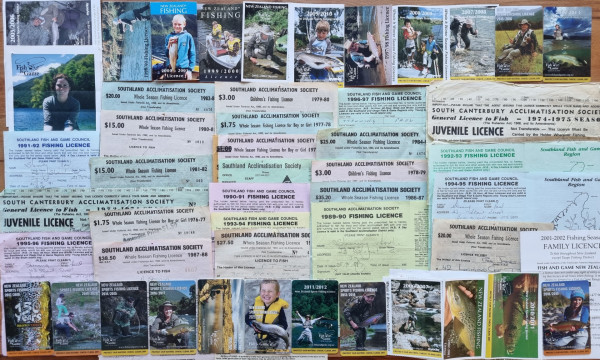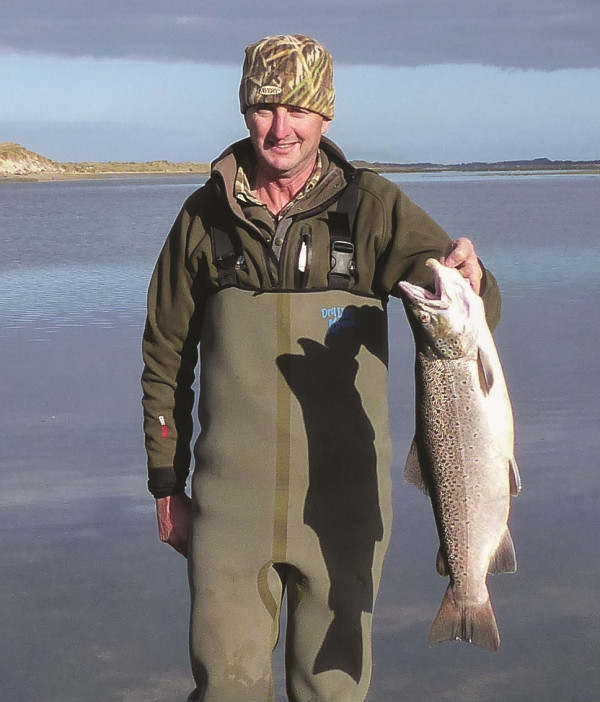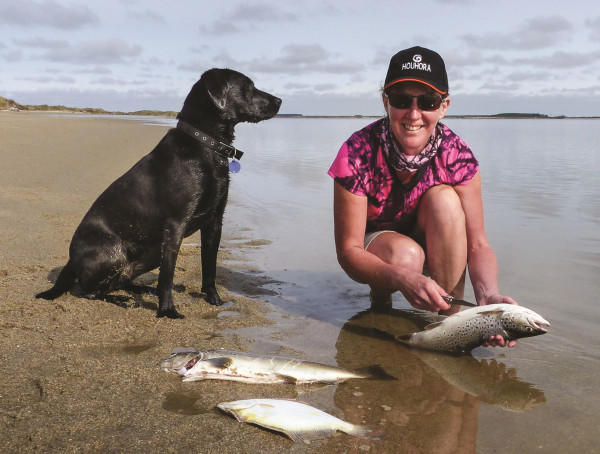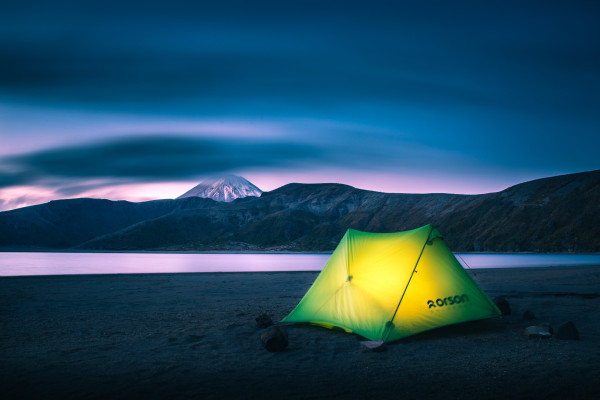Fishing for the Cost-Conscious
- 28/02/2024
By Paul Stenning
As a keen trout fisherman, I had looked forward to this stage of my life. My children are all grown up and independent, the mortgage and the other liabilities of those early years are now a distant memory. Finally, the financial and time constraints that I believed were limiting my ability to go fishing during those tough years are no longer an issue.
Yet as I prepare to purchase my fiftieth freshwater fishing licence, all those tough years when fishing had to take a back seat made me realise one very important thing - you can still have an enjoyable and successful trout fishing season with limited time and financial resources.
Through necessity, I was quite the minimalist when it came to the fishing gear I was using, and even now that I have the disposable income to get top-of-the-line fishing gear with all the nice accessories, quite the opposite has happened. I still have a very uncluttered and basic approach to the gear I use.
I have learned that the key to having successful fishing seasons is to concentrate my resources and efforts on finding ways to go fishing more frequently. More importantly, at the right time and in the right conditions. Despite having fewer commitments, I haven't changed my approach to fishing from the years when time and money were a concern.
Surveys have shown that your average New Zealand freshwater spin angler only fishes a handful of times in a season, the limiting factor being the usual culprits of lack of time and money as it was in my case. A fishing licence and the essential fishing gear are a considerable outlay if you only fish a couple of times a season.
Many people are currently facing tough economic times. How do you maximise the frequency of fishing trips to get the most value out of your license and gear?
Firstly, fish the entire season! Many spin anglers delay buying a fishing licence until the weather or river conditions improve during summer and give up when the weather cools down in autumn. The very best time for spin fishing is early in the season when trout are eager to put on condition after spawning. There is minimal insect activity in the cool water, so trout will target the foods imitated by fisherman such as smelt, cockabullies, worms and juvenile fish. The same applies later during autumn and in the early winter months, in waters that have an open season. During these times, the trout are in prime condition and become vulnerable as they start moving to their spawning waters.

49 years worth of licences.
How often do you finally have the opportunity to go fishing, only to be met with a terrible weather forecast? The reality is that you do not need good weather to go fishing. While a nice, bright, sunny, summers day might be pleasant to fish in and great for a family outing, they are some of the toughest conditions for a spin angler to try and catch a trout! When spin fishing, your chances of success can be greatly improved by fishing on cloudy or windy days. With wind putting a ripple on the water there is less chance of the trout seeing you. On cloudy dull days, you are also less visible as you will not stand out in the sun or throw a shadow, and your lures will look more natural and harder for trout to pick as a fake. If fishing a lake target the downwind side if possible. It will be harder to cast, but the fish will be feeding close to the edge where the waves are churning up the food for them.
As for rain, the old saying "trout are wet anyway so they don’t care if it is raining" has never been truer! One of my most important pieces of fishing gear is my rain jacket.
If you have an old-school barometer hidden away somewhere, get it out and look for a rising glass after a bad weather front has moved in. Even if the weather has not yet improved, a rising glass can have the trout feeding hard and on the bite.
A lot of spin anglers miss some of the best trout fishing that is to be had by thinking that high or discoloured rivers are not suitable for fishing when quite the opposite is true. A clear sunny day and a clear low river can be tough conditions for spin fishing. Excluding rivers in flood, a high or discoloured river can produce exceptional spin fishing for several reasons. A lot of trout food is washed into the river with the high flows. The poor visibility of the discoloured water means trout must quickly take any food they find. The discoloured water also makes it difficult for trout to see you, and with the high flows pushing aggressively feeding trout to the edges, the action can be close and fast.
Lakes also fish well when there has been heavy rain, whether it is at the river and stream mouths where coloured water enters the lake, or where the lake level has increased, flooding new ground and making all sorts of food available for trout. Once again, they will be on the move around the edges and all the food available has them letting their guard down, so normally spooky trout can be quite silly and attack almost any lure presented in the right conditions.
Many anglers are missing out on another opportunity: the time of day they choose to fish. The very best time to spin fish is at the change of light in early morning or late evening, especially if river conditions are low and clear, or during high daytime temperatures during summer. I really enjoy being out on the river or lake early in the morning to witness the sunrise. It's a truly magical time and it benefits not only my soul, but also my ability to catch trout.
Even though there may be unlimited fishing opportunities to be had, that does not mean we have unlimited time to get out fishing as often as we would like in this crazy busy world. I've learned a few tricks for finding time to go fishing, even with all my family and work obligations.
Getting to know my local waterways was a big key to being able to fish more often. It would be nice to fish in picturesque and productive up-country rivers and lakes all the time, but the more I fished the less glamourous local waterways, the more I learnt how underrated they were, and at what times and conditions they could be surprisingly productive, especially if they were tidal waters.
I am now greatly drawn to the local tidal waters for various reasons. Estuaries, tidal rivers, and lagoons have an abundance of large food items available, which are easily imitated with spinning gear. They produce the most stunning silver trout, which due to the big food items available, can grow to an impressive size with great-tasting deep orange flesh. One of the advantages of fishing in tidal waters is that you may unexpectedly catch other species such as salmon, flounder, mullet, or kahawai.

Local tidal water can produce stunning silver trout.
Fishing in tidal water can be unpredictable as it depends on specific factors such as tides, the moon, and the movements of bait fish and other food sources. Trout may enter tidal water to pursue these food sources. To make it even more challenging these conditions can vary from one tidal water to another. So do not give up if you are unsuccessful, but try again with different tide or weather conditions.

Fishing tidal water for trout also gives you the chance of bonus species.
Out of choice, I now do most of my fishing within thirty minutes of home and always have my eye on what the tides and moon are doing.
By fishing locally, you can make the most of even just a few spare hours to enjoy a good catch. This means getting on the river early in the morning or later in the evening during the longer summer days. Not only will you be fishing during a productive time, but you'll also have most of the day to attend to your other commitments.
Fishing local also means you will spend less on transportation. Fuel and other associated expenses of running a vehicle easily trumps any other costs relating to fishing, so how do we make savings if we want to travel further afield to fish a favourite spot?
Fishing with a mate (or two) and having turns about at taking your vehicle halves your transportation costs or, perhaps allows you to fish twice as often. If you don't know many people who trout fish, there are clubs spread across the country that you can join to meet like-minded people.
If you are like me and enjoy the peace and solitude of being by a river fishing by yourself, maybe just with the company of your canine friend, you can still share the travel costs with a mate. There are many rivers with good access where a mate and I will travel to together, and one of us will get dropped off at one access point and the other drive up to the next access and fish upstream from there. Whoever got dropped first fishes up to the parked vehicle and then drives up to an agreed place to pick up the other. You get to cover a lot of water without the big walk back to the car which you quite often get when there are two of you fishing together Just be sure that if you are the one being dropped off you leave some fresh footprints in a place that anyone who arrives later will see, and know the water has already been fished.
Another way to get better fishing value from your outlays in transport is to camp out for the night. This does not have to be the full glamping experience or require a lot of organising, set up time or big clean up when you get home. Once again, the process was simple and uncluttered for me. If time and weather allow, I set up my simple two-man tent, blow up my air bed, throw in sleeping bag and pillow and I am off fishing.
Big trout let their guard down during the change of light and into the night.
It is amazing how well you sleep after some fresh air and a few hours walking a river or lake edge, so I quite often now just sleep in the back of my ute or recline the front seat, to get a few hours kip, especially if the weather or forecast is bad.
As for food, I make that just as uncomplicated. During the long daylight hours of summer, I may eat my evening meal before I leave home. Otherwise, I pack a flask of hot drink and some sandwiches for later. Breakfast can be as simple as an up-and-go type drink and a banana or other fruit. No cooker, cutlery or dishes and no clean-up when you get home.
Camping out has become a big part of my fishing. Although initially it was driven by me trying to get more fishing for my fuel dollar, now I do it because it has me fishing at the most productive times. I often leave home in the late afternoon or early evening, fish till dark or just after, out of my sleeping bag at first light fish for a few hours then be home before lunch.

Camping out has become a big part of my fishing. Although initially it was driven by me trying to get more fishing for my fuel dollar, now I do it because it has me fishing at the most productive times.
Something else I also did during those tougher times was bring home a trout or two to eat from waters that could sustain harvest. Not only did it offset the cost of my licence and other expenses but it meant I was feeding my family healthy, free-range and very tasty food. Now choosing a suitable trout to take is a big part of my fishing, not necessarily to save money but simply because we love eating food we harvest ourselves, know it's origin and the story behind it.
At the end of the day, whether you want to enjoy the physical and mental health benefits of time in the outdoors, be a more successful fisherman, have more places to fish and understand the best times and conditions to fish them, or want a better chance to take home a trout to feed your family, there is just no substitute for time on the water. The more you can get out, the better value you will get from your fishing licence and fishing gear. So even when times are tough, you can find ways to get out fishing more... I did!